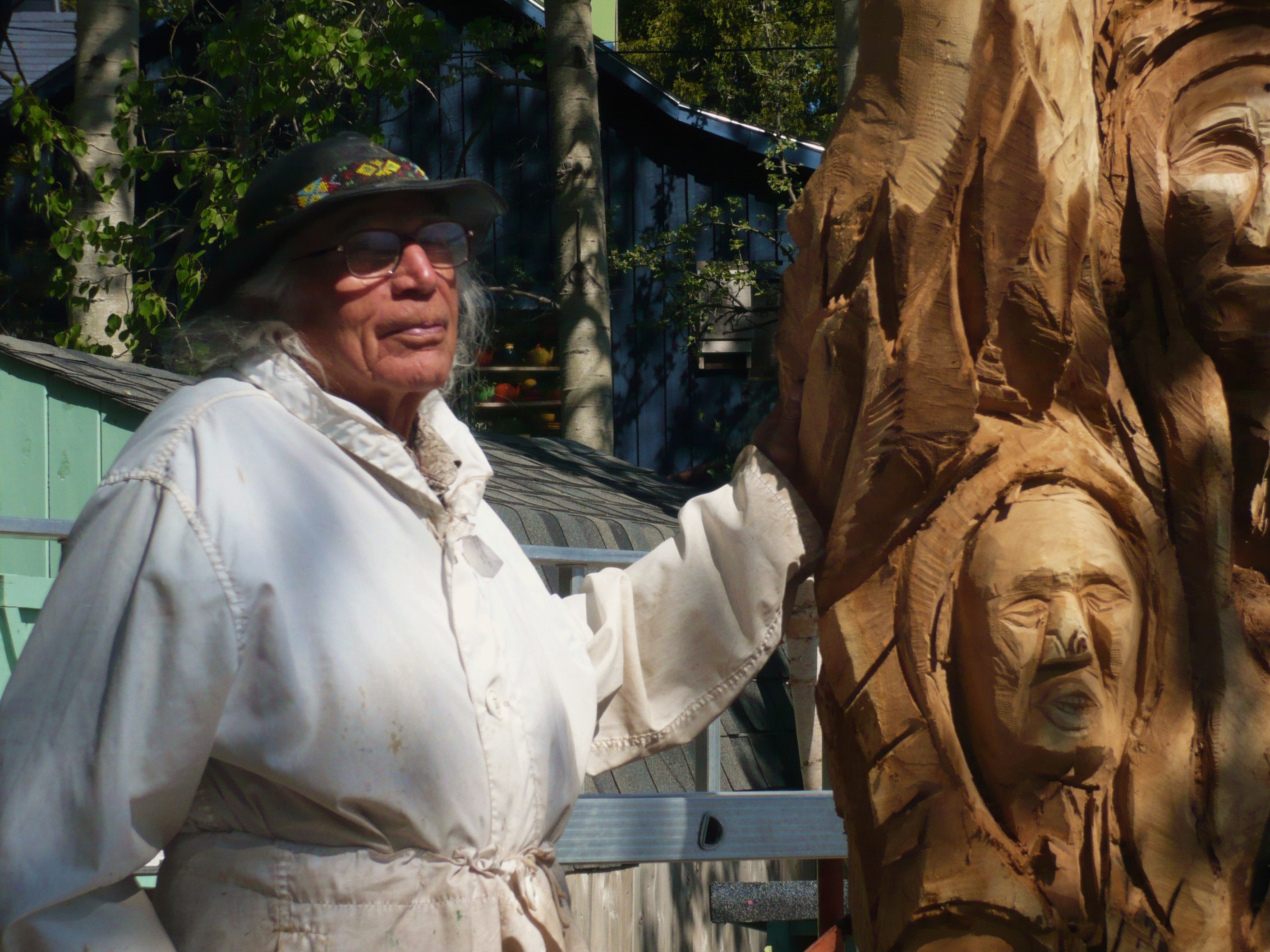Remembering elder, author, carver Wilmer Nadjiwon

Wilmer Nadjiwon -A. Cuffe photo
By Denis Langlois Owen Sound Sun Times
A sacred fire is burning at Neyaashiinigmiing and a funeral is being organized for Saturday morning as people mourn the death of respected and well-known Ojibway elder Wilmer Nadjiwon.
The residential school survivor, Second World War veteran, former Chippewas of Nawash chief, author, mentor and celebrated carver died Wednesday. He was 96.
Current Chief Greg Nadjiwon, Mr. Nadjiwon’s nephew, said his uncle will be greatly missed.
Mr. Nadjiwon “dabbled in everything” during his lifetime, he said, from the arts to politics and from dancing at powwows – even at age 95 – to running his own businesses on the Bruce Peninsula.
“He was a mentor. He was probably one of the reasons why I chose this path (to becoming chief). He walked many, many paths,” he said Thursday in an interview.
“Over the last several years being in my position on council in the community, I’ve dealt with a lot of people going on their final journey and celebrating their lives. And this one’s a little harder. It’s having an impact as you reflect. He was a true leader.”
Trish Meekins said Mr. Nadjiwon, her grandfather, was able to accomplish so many things of which to be proud.
“He was the last surviving veteran from World War Two of Neyaashiinigmiing who had seen combat. He is world-renowned for his Indian carvings, he authored a book about some of his stories, taught some of the top survivalists how to survive in the bush. He kept the (aboriginal) culture alive even if he wasn’t on the reserve,” she said.
Mr. Nadjiwon’s sacred fire was lit Wednesday in the fire lodge at the Maadookii Seniors Centre and will continue to burn until his funeral.
“The fire is a representation of his life. People are going there to talk to him and visit with family too,” Mr. Nadjiwon’s son, Wendall, said.
The funeral is set for 11 a.m. at the community centre at Neyaashiinigmiing. Visitation is scheduled for 7 to 9 p.m. Friday at the same location.
Mr. Nadjiwon was born at Cape Croker in 1921 to the late Peter and Charlotte Nadjiwon. He had eight brothers and sisters.
As a youth, Mr. Nadjiwon was ordered to attend St. Peter Clavier Residential School in Spanish, Ont., where he suffered years of abuse. He left the school in 1935.
Years later, in 1942, he enlisted in the Canadian Army at age 21. He trained to be a signalman and was a gunner as well, fighting in Italy. His six brothers also served in the war; each of them returned home.
Mr. Nadjiwon recalled during an Honouring Our Local Veterans event in 2012 in Owen Sound about getting into trouble for taking off without permission to visit his brother who was only a few miles down the road as the battle raged on.
That brother was the current Chief Nadjiwon’s father, Rae.
Mr. Nadjiwon served as chief of the Chippewas of Nawash for 14 years in the 1960s and ’70s. He was first elected in 1964.
He often recalled, in his writings and in conversations, kicking four Indian Agents off the reserve during that time.
Meekins said she remembers hearing about those stories when she was a young child.
“I would say that was one of the many highlights of his time as chief,” she said.
Mr. Nadjiwon was also a founding member of the Union of Ontario Indians in 1964 and served as a councillor at Chippewas of Nawash in the late 1980s.
He wrote about his life in the 2012 book, “Neither Wolf, Nor Dog: An Ojibway Elder’s Tales of Residential School, Wartime Service, First Nations Politics, and Some Experiences with the Great Spirit.”
Wendall Nadjiwon said his father was “a warrior but he had a kind heart.
“A lot of people loved him. He was a great man.”
He noted his father experienced a lot of hardships and struggles in his life, including war and “unbelievable racism.”
Mr. Nadjiwon had 13 children, many grandchildren, great-grandchildren and great-great grandchildren.
He once owned The Indian Carver shop on the Bruce Peninsula and developed and ran Cha Mao Zah, a campground at Tobermory.
He was well-known for his carvings, which he would sell and also create at exhibitions, trade shows, Aboriginal events and fairs across Ontario and beyond. He once wrote that he got his first lesson in carving as a young child “from a very old, cultured native.”
He held many other jobs over his lifetime. As he put it, in a 2012 column in The Sun Times, “I have been many things in my life: a fisherman, a trapper, a hunter, a construction worker, a student, an activist, a politician, an Indian chief. I have worked in logging camps and factories. I have walked the steel, painted houses, picked fruit, gathered cedar brush and tried to start businesses; some failed, some succeeded.”
He was also a promoter of native culture, campaigner for First Nations unity and an activist who, while in his 80s, opposed the controversial Dump Site 41 project near Elmvale.
“He was a politician at heart. He was always self-sufficient; he always found some means to make a livelihood. He was a writer, a storyteller,” Chief Nadjiwon added.
Toronto Star book review – 2012









Leave a Reply